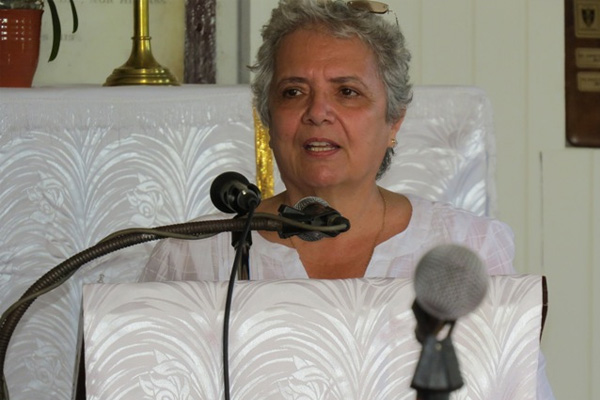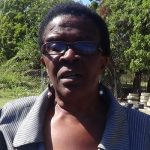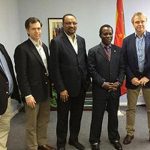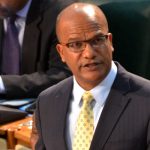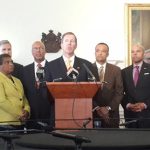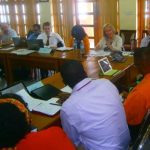Victoria Borg O’Flaherty: “While Fitzroy Bryant brought personality, Lee Moore, oratory, St. John Payne brought dependability”
Basseterre, St. Kitts (CUOPM) — “Our country and our world need people like St .John Payne because they do what they do not for the glory but because it has to be done,” said National Archivist and Historian, Mrs. Victoria O’Flaherty.
Delivering the feature address at the annual Requiem Mass for fallen Labour leaders at the St. Paul’s Parish (Anglican) Church on Sunday, Mrs. O’Flaherty said the late former Government Minister in the Labour Party Administrations of Premiers Sir Robert Bradshaw, Sir C.A. Paul Southwell and Sir Lee Llewellyn Moore, hoped that “St. John’s life story be an inspiration to us all as we continue were he left off.”
She told the congregation that included Governor General Sir Edmund Lawrence and Lady Lawrence; Deputy Governor General of Nevis, Mr. Eustace John and Mrs. John, former Governor General, Sir Cuthbert Sebastian; Prime Minister the Rt. Hon Dr. Denzil L. Douglas, Cabinet colleagues, Members of the Diplomatic Corps and supporters of the St. Kitts-Nevis Labour Party and the St. Kitts-Nevis Trades and Labour Union, that Esmond St. John Payne was born in Anguilla on the 2nd August 1937 to Isa Payne who worked as a domestic.
“His mother, wanting him to grow up to be a principled individual, took him often to the Salvation Army services and later to Sister Rose’ Church in St. Kitts. He was educated at the Basseterre Boys’ School till he reached the age of 13 when he left school to look for work. It was the search for employment that eventually took him to England in 1960, leaving behind in the care of family, his first son Trevor. But St. Kitts stayed in his soul and he kept in touch with family and friends. He also looked forward to the arrival of the Labour Spokesman in the mail with news which, by the time it was delivered to him, would no longer have been news. Still it was a precious link with home. In Leeds where St. John first went, he became part of a Kittitian community where people like Jack Warrington of Basseterre looked out for newcomers and helped them deal with the ordeal of settling down in their new environment
St. John realized that England had much to offer in the way of personal development and when he saw the chance of a higher education, he grabbed it and as a mature student continued to work at improving his intellectual abilities and the skills that were to prove an asset when he returned to St. Kitts. He started with Social Studies at Harlech, moving on to a B.Sc in Economics and Social Studies at the University of Wales at Swansea and finally a course in Industrial Relations at the University of Bradford.
His academic background was ideal for the jobs he undertook when he returned to the State in 1970 and was appointed Chief Executive Officer of the St. Kitts-Nevis Trades and Labour Union and nominated to the House of Assembly. The following year he contested the general election as a candidate for constituency number six which at the time stretched from Parsons to Lodge. That year the Labour Party presented a slate of candidates that was a mix of stalwarts and academically trained professionals who could discredit PAM’s accusation that Labour had nothing to offer the educated people of the country. After an intensive campaign all labour candidates won their seat and St. John was appointed Minister of Agriculture, Lands, Housing and Labour. He won 68% of the vote in his constituency and he was able to hold over 60% of that vote in the elections of 1975 and 1980. The Democratlater suggested that his was a “Cinderella entrance” into politics “on the coat tail of Bradshaw.” St. John would have been the first to admit that he could not have done it on his own. He won his constituency because he was part of a team that had a charismatic leader in Robert Bradshaw and that held the promise of fresh perspectives for the country. While Fitzroy Bryant brought personality and Lee Moore brought oratory, St. John Payne brought dependability to the table.
Within weeks of returning to St. Kitts, after an absence of 10 years, he was asked by Premier Bradshaw to hand in a report on the stand that Government should take towards National Bank’s first public offer of shares. With Horatio Versailles and Suswin Mills he worked on the report that was handed in on time and resulted in the Government becoming a majority share holder in National Bank
He also played an important role in the decision to acquire the sugar lands and the Basseterre Sugar Factory in 1975 and 1976. Young Labour had been advocating the nationalization of the sugar industry since 1969. In 1971 nationalisation became a subject in the Labour manifesto. As minister, St. John would have sat down and contemplated the burdens and risks of taking on an industry in difficulty against the possibility of employment and production. The recommendation he submitted to Cabinet were based, not on an emotionally charged situation, but on the benefits it would bring to the country and the people involved in the industry. He described himself at this time as “chief sugar farmer and the most powerful land owner the country had ever seen.” It was not a boast but a recognition of the great responsibly entrusted to him.
His speeches during his time as minister were not sensational but hint at what he might have felt. There was a sense of satisfaction in the increased sugar production of the mid-1970’s and in the creation of CEMACO that was meant to market the agricultural produce of NACO and individual farmer and increase the availability of local produce. It was after all a very concrete step towards a sustainable economy. One senses subdued frustration and even a bit of resignation when he spoke of the low international price of sugar, the increasing cost of fuel and inflation, things he could not change, but which impacted on the sugar industry especially after the government’s attempt to rescue it. Again one senses pride when having lived and experienced what social security did for workers in the UK, he was able to put in place similar developments in his home state. And he did not hesitate to give recognition the late Premier Bradshaw for his contribution to this improvement when Social Security took over where the National Provident Fund left off.
His career was inspirational to some of the young men he came in contact with on his return to the Caribbean. He encouraged them to pursue greater dreams than were possible at home. He kept in touch with them being well aware that the cold climate, the isolation and the racism of England, as well as the fiery West Indian temperament would not make the transition easy. He introduced them to the people he knew would provide them with a little bit of home when they needed it. When he visited England, he also made sure of contacting them. It was during one of these visits in 1979 that I met him first. He had let Fidel know that he would be in London. For Fidel this meant he could talk to somebody from home. So we took a train to London and I was introduced for the first time to a family directly from St. Kitts. St. John welcomed both of us but gave me a rather inquisitive look. I got the feeling that he was trying to figure out what made me tick – whether I knew what I was letting myself into by opting to marry a Kittitian and planning to live in St. Kitts, but he said nothing and eventually he left me with Pearl and the boys while he and Fidel talked of home.
Both of them were concerned with the transition period that the Labour Party and the Union were undergoing following the enormous loss they had suffered in the passing of Premiers Bradshaw and Southwell so soon after each other. It was not an easy time and St. John acknowledged that people had to get used to the new roles they found themselves in. This was not accomplished without difficulty and in the end the Party lost the seat in Central Basseterre and then was stunned by the unexpected coalition formed by PAM and NRP following the election of 1980.
Although St. John kept his seat, the times were changing. The turbulent days that had followed the death of Bradshaw in 1978 had taken their toll but there had been deeper changes within Kittitian society. Studies showed that at the time of St. John’s returned to St. Kitts, employment in the industry was declining, not because there were no jobs in it but because people, especially the young, did not like the idea of laboring in the cane fields. This had resulted in migration to the UK, the Virgin Islands and the US. Those that returned brought back with them expectations that could not always be met. The Labour Party’s base had always been the workers in the industry but that base was no longer as strong as it had once been. The courting of the emerging middle class was not consistent and this had worked to the disadvantage of the Labour candidates.
St. John remained devoted to his constituents and visited them every Sunday without fail. Sometimes his sons Gareth and Michael tagged along. The boys attended practically every public meeting that the Labour Party organized and were often front and center in the Labour Day marches. They had even started helping to set up the equipment for the meetings. After Fidel returned to St. Kitts in September 1981, St. John would pass for him on his way to his weekly visits to the constituency. Fidel could chat up a storm with anyone and being unemployed; he had time on his hands to do just that. St. John listened attentively. They made an ideal partnership. St. John would return to town with errands to run for the older people in the villages, who often asked him to do things like pay their electricity bills for them, as some of them worked in the industry and could not get time during the week. However, as a member of the opposition, his influence had waned and he no longer could serve his constituents as in his ministerial days.
To make ends meet and support his family, St. John tried to start a small import business during this time. It was from him that I bought my first fridge and stove. The election of 1984 made things worse for him. By this time there were a number of youths who had attended the various high schools under the new comprehensive system who were looking to have their expectations fulfilled. Their political loyalties were up for grabs. When Labour lost the elections in 1984, St. John lost his seat. This meant that his parliamentary allowance was gone too. In those days lawyers and doctors could opened their own private practice but there was little demand for economists outside of Government circles. With two teenagers quickly reaching college age, he had to do more than sell the occasional appliance. Ross University had an opening for an Administrative/Executive Officer. St. John interviewed for it and was offered the position. This was exciting for him and he felt that this opportunity would enable him to put his experience and expertise to good use. His wife Pearl remembers how on the Monday morning he prepared himself for work and went merrily down to Ross University to start his new job. By 9.30am he appeared at the Central Bank where she worked. She asked him if he had not gone to work. He replied that he had but was told on arrival that Ross University had received instructions from the Prime Minister not to hire him. He was very disappointed but knew that there was nothing he could do.
St. John tried a number of other options but none of them were producing the results he needed. Finally a cousin suggested a move to Canada. Disappointed that he could not stay in St. Kitts but recognizing his responsibilities to his family, he made the move. He became the Assistant Campaign manager of the United Way of Greater Toronto, an organization that raised funds for local groups that addressed community issues. His tasks included the supervising of fund raising campaign employees, monitoring publicity and training volunteers. Then in 1991 he became a consultant to the Public Appointments Secretariat in the office of the Premier of Ontario. This meant he was an adviser on appointments to agencies, boards and committees and received reports from them. This recognition of his abilities however did not dampen his interest in what was going on in St. Kitts. His heart remained with the Labour Party at home.
Following the 1995 Labour victory in the polls, St. John Payne was only too happy to return home to do his part in the new administration. I was in awe of his reconstruction of the scattered and missing cabinet minutes from the previous administration. I sensed an ally that I needed desperately since he understood the value of records and the stories they tell. But he had other responsibilities for he was the Ambassador of St. Kitts and Nevis to CARICOM, the OECS and the ACS and in 2001 he was even appointed Ambassador Extraordinary and Plenipotentiary. He also served on the board of the newly created National Housing Corporation and the Whitegate Development Corporation. Prime Minister Douglas described him as “that oasis of calm efficiency, with an admirable enduring spirit and a deliberate haste in work and most aspects of his life.” Then his illness came and we lost a man who understood what it meant to work well and to work consistently.”

